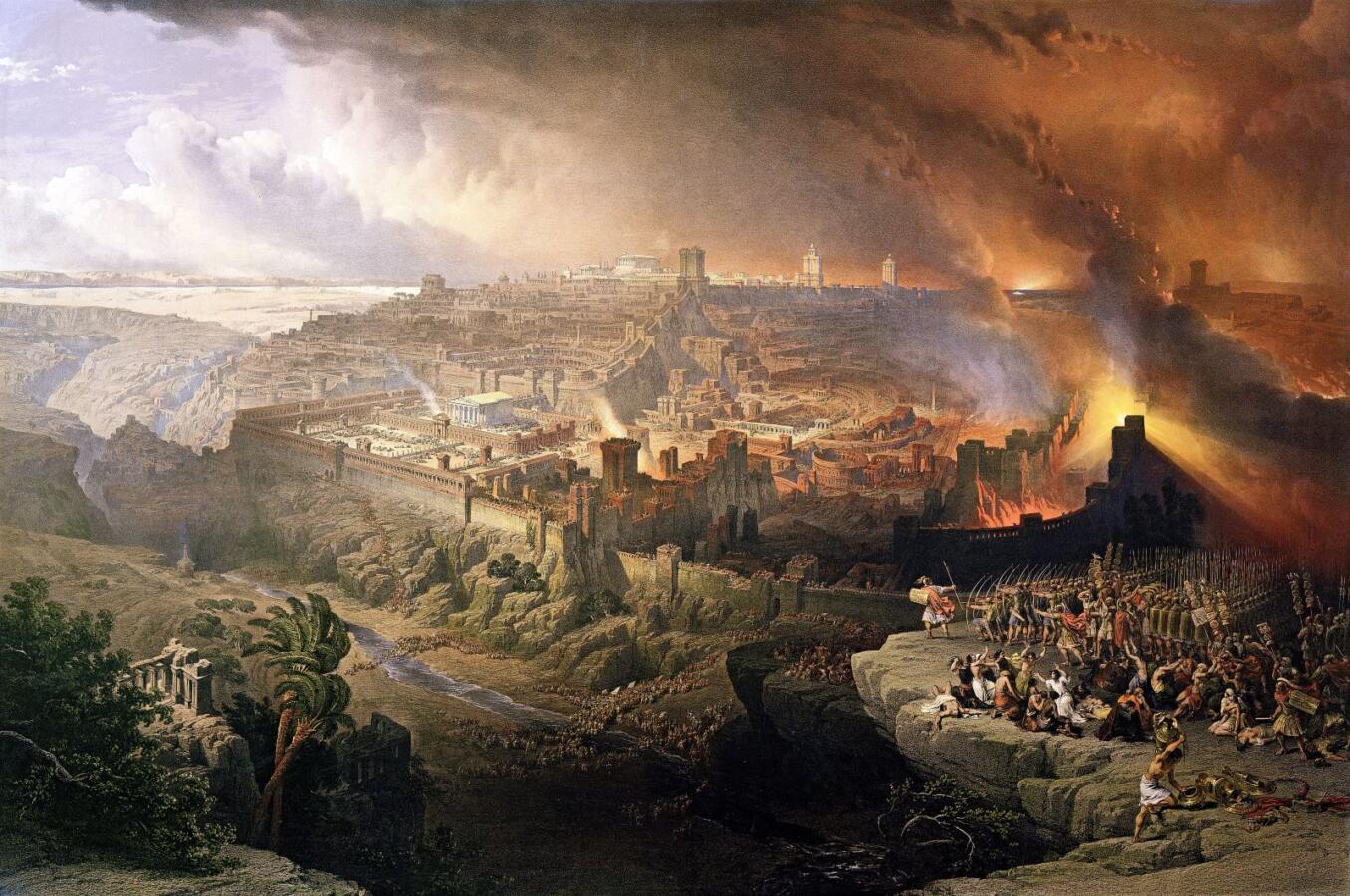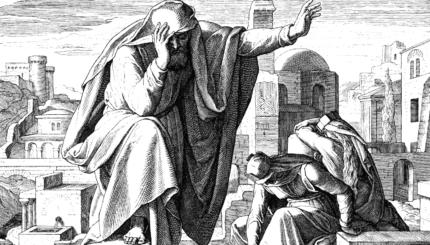The Babylonian Talmud relates the dramatic story of Rabbi Johanan Ben Zakkai‘s escape from the Roman siege of Jerusalem in the year 70 C.E. Before the Romans breach the walls of the city, Ben Zakkai abandons the spiritual and governmental capital of the Judean state, even while the Temple is still standing. He foresees the fall of Jerusalem, and so he has himself smuggled out of the city in a coffin. Through flattery, and by humbling himself before the Roman general, he is able to negotiate a deal, allowing him to establish a new center of learning in the city of Yavneh (Gittin 56b).
The historical veracity of this tale is questionable, but the talmudic narrative encapsulates an important shift in the political and religious life of the Jewish people following the destruction of the Second Temple. The story of the founding of Yavneh represents the birth of rabbinic Judaism, a way of life focused on Torah and Jewish law, rather than Temple worship or political sovereignty.
From a distance of 2,000 years, it appears that this shift in priorities enabled the spiritual wealth of Israel to become migratory, based on Torah study, not on the location of an altar or a King’s palace — Jerusalem to Yavneh, to the North of Israel, to Babylonia, and finally throughout the Diaspora. Were the rabbis willing to remodel the former Jewish kingdom into a wandering people unified only by a shared text? Were they enthusiastic about this shift, which empowered scholar over priest and King? Or was the founding of Yavneh a contingency plan, meant to preserve Jewish identity during the years of Roman rule, always awaiting a return to Jewish sovereignty in the Land of Israel?
The stories told in the Talmud and Midrash offer a window into the rabbis’ perspectives, many of whom were already living comfortably in the Diaspora at a distance of hundreds of years from the Temple’s destruction.
The Bar Kochba Revolt
If the story of the founding of Yavneh suggests that the rabbis were content to leave the institutions of Statehood and Temple in the past, the figure of Rabbi Akiva — who lived two generations after Ben Zakkai — complicates this narrative.
Akiva supported the Bar Kochba Revolt (132-136) and even believed that Bar Kochba himself would be the Messiah. In one famous vignette in the Talmud, Akiva is walking with a group of his colleagues near the ruins of the Temple. The group witnesses a fox running over the desolated Holy of Holies. While his companions cry, Rabbi Akiva laughs. The other sages balk at his reaction, but he explains: “Now that I have seen the prophesies of destruction fulfilled, I believe that the prophesies of redemption will be as well.” (Makkot 24b)
For Akiva, the promise of redemption is very real — and, indeed, lurking right around the corner. The paradigm of destruction followed by Messianic redemption was deep-seated in rabbinic thought. Their expectations were molded by the experience of the destruction of the First Temple, which led to the Babylonian exile but was swiftly followed by a return to Israel and the building of the Second Temple. Some historians suggest that the supporters of Bar Kochba were anxiously anticipating Bar Kochba’s victory to lead to such a restoration.
However, Akiva’s support for the rebellion is judged foolhardy by the majority of sages. In response to Akiva’s belief in the Messiah’s nearing, one colleague scoffs: “Akiba, grass will grow out of your jawbones [out of your grave], and he will still not have come.” (Lamentations Rabbah 2:5 & Jerusalem Talmud, Ta’anit 4:8). Lamentations Rabbah briefly records Rabbi Akiva’s optimism, but the narrator swiftly crushes this spirit by brutally recounting the story of the defeat of the revolt, as well as criticizing Bar Kochba.
Passively Awaiting the Redemption
Though we can’t pinpoint a specific moment of change, rabbinic thought came to accept the reality of subjugation. The Talmud describes a contract of sorts in which the Jews swear not to return to Israel by force, not to rebel against the nations, and not to extend or prematurely shorten the length of their exile; God then promises to prevent the subjugating nations from overly oppressing the Jews while they live under foreign rule. (Ketubot 110b-111a).
Does the rabbinic acceptance of exile mean that the rabbis of the Talmud abandoned the idea of Israel as the singular spiritual capital? There is no simple answer. Following Bar Kochba’s rebellion, yeshivas (houses of study) continued to flourish in both Israel and Babylonia. In fact many talmudic texts describe rabbis traveling back and forth, fueling a friendly rivalry between these two centers of Judaism. While some rabbis in the Talmud extol the value of learning in Israel, and make decrees against those who would leave, Babylonian rabbis place such a premium on their yeshivas that they too forbid their students to leave Babylonia (Ketubot 110b).
An Abiding Love for Israel
Talmudic descriptions of the exceptional nature of the Land of Israel are split as well. The Talmud’s statement that “It is better to live in Israel even when it is overrun by non-Jews” seemingly encourages Jews to remain in Israel even as the Jewish population there began to dwindle (Ketubot 112). On the other hand, the Talmud describes the Land of Israel as a magical place, where cake and silk clothing grow straight from the ground (Ketubot 111b). This type of description propels the Land of Israel into a myth, a place of perfection and fantasy, reserved for a far-off redemption.
Perhaps it is possible to discern two streams of rabbinic thought — one holding on to a realistic dream of strengthening Jewish settlement in the land; the other content to live in the Diaspora and relegate Israel to a distant reverie, symbolizing an eschatological end of days.
Even as he established his yeshiva in Yavneh, Johanan Ben Zakkai’s facile acceptance of Roman rule perhaps belies his true feelings. He flatters the Roman general with a verse: “Jerusalem will be captured by a ‘mighty one’.” While Johanan’s meekness towards Rome wins the Jews a modicum of protection, the subtext of his flattery is quite subversive. In its original biblical context, “the mighty one” refers to the Jewish messiah, not to a foreign conqueror! It is as if Ben Zakkai is actually teasing the Roman general–who is unfamiliar with the Bible — saying: We will accept your temporary rule, study our Torah, and bide our time.
Talmud
Pronounced: TALL-mud, Origin: Hebrew, the set of teachings and commentaries on the Torah that form the basis for Jewish law. Comprised of the Mishnah and the Gemara, it contains the opinions of thousands of rabbis from different periods in Jewish history.
Torah
Pronunced: TORE-uh, Origin: Hebrew, the Five Books of Moses.
yeshiva
Pronounced: yuh-SHEE-vuh or yeh-shee-VAH, Origin: Hebrew, a traditional religious school, where students mainly study Jewish texts.



